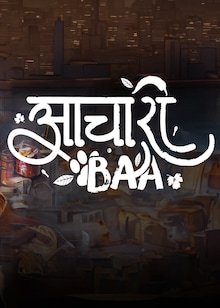Aachari Baa


A Gujarati grandmother revives her beloved pickle-making tradition, rekindling memories and connections with her family. As she shares her recipes and stories, the community comes together, discovering the magic of her homemade pickles and the love that binds them all, creating a heartwarming tale of family and tradition.
March 14
2025
Release Date
Hindi
Language
38 minutes
1 hour
Running Time
Available on
Cast


Apoorva Arora


Kabir Bedi


Neena Gupta


Vandana Pathak


Manasi Rachh


Vatsal Sheth








Shah Bhavya








Vaishnavi Ganatra








Maulik Nayak








Pyarali Nayani








Atharva Sharma








Gopal Singh








Jagruti Thakore
2.5
Average Rating
The above-mentioned average rating is based on the derived ratings of multiple review platforms
OH Review


Movie Review: Aachari Baa
Plot
The film "Aachari Baa" tells the story of Jaishnavi, a 65-year-old woman played by the talented Neena Gupta, who is invited to her son's home in Mumbai after many years apart. This serves as the backdrop to explore significant themes such as women's independence, negligence by the parents, and the loneliness that often accompanies old age. The plot is relatively simple and follows familiar territory, as we see Jaishnavi, a pickle-maker from a small town in Gujarat, struggle to adjust to her new urban environment.
After arriving at her son's house, she learns that he and his family are leaving for a vacation in Darjeeling, which leaves her alone to care for their pet dog, Jenny. Initially bewildered and out of her element, Jaishnavi's character gradually begins to bond not only with Jenny but also with the residents of the apartment complex. The story attempts to dive deeper into the relationship she has with her son, Ketan, but fails to deliver significant emotional weight, often opting for predictability instead.
The film truly shines when it showcases Jaishnavi's interactions with the women from her hometown and her new relationships in Mumbai. While moments of emotional depth arise, the screenplay struggles to maintain momentum and often resorts to clichés, leaving the viewer longing for more complexity in the narrative. Although Aachari Baa aims for an emotional core, it ultimately ends up feeling somewhat sanitized, lacking the rawness needed to leave a lasting impact.
Furthermore, the introduction of her pickle-making talent leads to a series of lighthearted moments as the community rallies around her, but these are overshadowed by a predictable script that doesn’t take risks. As a spectacle, Aachari Baa is relatable, but the overly familiar framework detracts from its potential significance. Had the filmmakers taken bolder steps in exploring deeper familial and societal dynamics, the result might have been much richer and more rewarding.
Acting
Neena Gupta delivers a standout performance as Jaishnavi, fully embodying the character of an elderly woman navigating a series of challenges that many viewers can relate to. Her portrayal exudes a natural warmth that makes it easy to root for her character despite the story's shortcomings. Gupta's ability to convey emotional depth through subtle expressions and gestures makes her performance genuinely engaging. She never seems forced, bringing a genuine charm that draws you in, even if the script doesn’t always provide her with the best material.
On the other hand, Vatsal Seth's performance as Ketan feels noticeably underdeveloped. Given the character's limited interaction with his mother, Seth is reduced to little more than a supporting role, which lacks the depth necessary for the audience to understand the complexities of their strained relationship. The script does not provide him with sufficient opportunity to explore the nuances of their bond, making his contribution feel almost inconsequential.
In contrast, Kabir Bedi, who plays Brijesh Malhotra, the society’s secretary, delivers an earnest performance. His role serves as a bridge for Jaishnavi, helping her integrate into the community and draw attention to her talent. However, his character seems disconnected from the main plot, hindering the depth of both their interaction and the story as a whole.
The supporting cast, especially the women from Jaishnavi's pickle-making team, bring an authenticity to the film. Their camaraderie and shared experiences provide a much-needed warmth and relatability. However, this dynamic is somewhat lost as the film transitions to the urban setting, which leans heavily into predictable storytelling rather than letting the performances shine.
Overall, while the acting, particularly by Neena Gupta, was commendable, the performances are undermined straightforward script with no to very little room for emotional exploration. The film could have benefitted greatly from deeper character arcs and more substantial interactions among its cast members.
Cinematography
The visual storytelling in "Aachari Baa" is both charming and straightforward, capturing the essence of Jaishnavi's rural Gujarat town as well as her new life in Mumbai. The cinematography effectively contrasts the two settings, presenting a picturesque view of the warmth, vibrancy, and community spirit found in her hometown. The scenes showcasing Jaishnavi's interactions with her pickle-making colleagues are adorned with lush colors and inviting imagery, culminating in a sense of nostalgia that is palpable and relatable.
However, the shift to the urban landscape of Mumbai exhibits a stark difference. While the initial scenes set in Gujarat radiate authenticity, the latter half of the film tends to lean more into the generic and sanitized portrayal of urban life. The apartment complex feels uninspired and the vibrant interactions from earlier scenes diminish, replaced by a more subdued palette that fails to evoke the same engagement. The shift in tone impacts the film's energy, making it feel more like a set than a lived-in environment where characters could truly evolve.
Particular attention must be given to the moments when Jaishnavi bonds with Jenny, the dog. These scenes are framed beautifully, with close-ups that capture her emotional journey and budding friendship with the pet. The cinematographer successfully highlights the tenderness in these moments, allowing the audience to witness a genuine connection unfold.
Additionally, the song sequences add to the visual appeal, utilizing a blend of folk elements that celebrate Jaishnavi's heritage. These scenes provide a vibrant interlude, incorporating colors and dances that further enhance the film's atmosphere, even if they don't significantly contribute to the plot.
Overall, while the cinematography presents a visually pleasing experience, it suffers from inconsistencies in the narrative. The transition from the warmth of rural life to the predictability of urban living feels jarring, diminishing its overall beauty. A careful balance between both settings would have greatly enhanced the film's visual storytelling and emotional resonance.
Direction
Hardik Gajjar takes on the challenging role of director, screenwriter, and storyteller in "Aachari Baa." While he successfully captures the essence of an elderly woman's journey amid family disconnection, the film struggles to break free from the predictability of the storyline. The direction often feels over-sanitized, as though the film is hesitant to fully explore the complexity of its themes. Moments with emotional weight are diminished by a tendency to opt for sweet, easy resolutions instead of diving into deeper confrontations that would have added layers to the narrative.
Gajjar's choices to include Gen Z slang and other contemporary elements often feel forced and out of place, creating an awkward juxtaposition with the film's otherwise traditional themes. This could have been a moment for meaningful engagement between generations, but instead, it feels like an attempt to cater to a younger audience that doesn't quite connect with the film's core message. The lack strong emotional scenes does not allow audience to bind to the plot, leaving the emotional highs and lows feeling unearned.
Additionally, had Gajjar chosen to delve into the backstory and motivations behind the mother-son relationship, the film might have gained the depth and complexity it desperately needs. Exploring the reasons behind Jaishnavi's feelings of neglect could have established a more engaging dynamic and allowed for a layered exploration of their connection. Instead, the film often glosses over critical discussions that could add substance to the viewing experience.
On a positive note, Gajjar exhibits a knack for pacing, ensuring that the film moves along without unnecessary dragging. The light-hearted moments woven throughout help keep the mood uplifting, and his ability to create compelling interactions among the supporting cast provides a sense of community that resonates well with the audience.
Furthermore, Gajjar successfully captures the essence of pickle-making and the sense of camaraderie that exists within Jaishnavi's small town, conveying a warmth that is both inviting and enjoyable. The authenticity of these smaller interactions often feels more engaging than the larger familial dynamics, and it is clear that Gajjar has a genuine affection for the themes surrounding women forging bonds with one another.
Overall, while the direction in "Aachari Baa" showcases moments of promise and charm, it ultimately falls short in its execution. The missed opportunities to explore deeper connections within its main themes leave the film feeling flat, as it relies on familiar tropes rather than venturing into bold storytelling.
Conclusion
"Aachari Baa" is a film that seeks to tackle substantial themes related to aging, familial relationships, and the strength of community. Despite the compelling premise and the solid performance by Neena Gupta, it ultimately falters under the weight of conventional storytelling and a predictable script. The film's exploration of Jaishnavi's character reveals potential for deeper emotional exploration, but it often shies away from confronting the harsh realities it hints at.
The film’s strengths lie in its authentic portrayal of Jaishnavi's rural life and the exceptional bond she forms with her fellow women, which comes across as genuine and heartwarming. However, the transition to Mumbai appears less engaging, falling prey to clichés that deter deeper emotional resonance. Unlike the nuanced relationships established in her hometown, the interactions in the urban setting feel flat and often lack the meaningful connections that could elevate the narrative.
The performances offer their moments of brilliance, but they are overshadowed by a script that fails to develop the story's emotional core fully. The missed opportunities for confrontation and deeper reconciliation between Jaishnavi and her son leave a sense of longing for more depth and substance. As a result, the film feels like a missed opportunity to showcase the intricacies of familial relationships and the importance of community support.
In conclusion, while "Aachari Baa" presents a heartwarming story that touches on essential topics, it ultimately lacks the execution needed to resonate deeply with its audience. It serves as a gentle reminder of the challenges faced by the elderly and the importance of connection, but fails to break free from tropes and clichés that hinder its overall impact. A more daring approach to storytelling could have transformed this simple narrative into a powerful exploration of life's complex relationships. As such, the film is an enjoyable watch but falls short of becoming a memorable cinematic experience.
Share this review
The Great Reviews
Times of India
More like this
Mission: Impossible – The Final Reckoning
In Mission: Impossible – The Final Reckoning, in "Mission: Impossible - The Final Reckoning," Tom Cruise takes on his most daring mission yet. He join...


